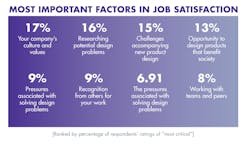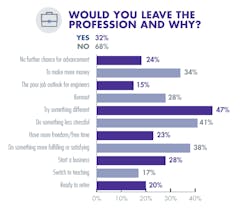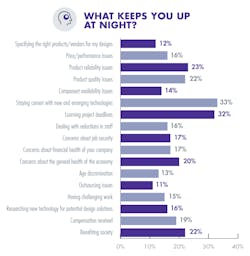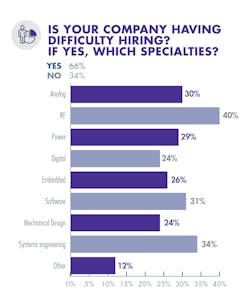Readers of a certain age might remember the old TV game show, “Family Feud,” and its host Richard Dawson’s signature cry of “Survey SAYS…” In that spirit, it’s time once again to unveil the results of the annual Salary & Career Report. The focus of this article, one of a series covering differing facets of the survey data, is job satisfaction. We wanted to know how engineers in the RF/microwave industry feel about their jobs. What do you like about work? Let’s have a look at what the data indicates.
A top-line result is that, for most of you, working is a positive experience. Some 70% of respondents say that they’re either “satisfied” or “very satisfied” by their jobs. Another 15% report being “extremely satisfied.” That leaves 15% who are “not very satisfied” or “not at all satisfied.” Overall, job satisfaction amongst electronic engineers remains quite high.
The highest-ranking factors that contribute to job satisfaction are “compensation you receive for your work” and “your company’s culture and values.” It’s not surprising that the paycheck comes first in determining satisfaction. But it’s somewhat surprising that culture and values rank so high in respondents’ concerns, outranking such perennially important factors as “challenges accompanying new product designs” and “researching potential design solutions.” Culture and values seem to be on many of our minds these days, not just at work but in our daily lives in general.
The other side of that coin is the number of respondents who say they would consider leaving engineering as a profession. The good news on this score is that this year’s number (32%) is down from 2018 (40%). The two most popular reasons were to “try something different” and to “do something less stressful.” Some 20% say they’re “ready to retire,” another 28% would like to “start a business,” and about a third of respondents want to “have more freedom/free time.”
Every profession has its list of things that cause sleepless nights, and engineering is no different. Chief among them is “staying current with new and emerging technologies.” On that point, one respondent commented, “It’s hard to find resources which offer in-depth knowledge. Most of the information available through on-line sources or books is superficial or a generation behind.” In close second place among troubling aspects of the job is “looming project deadlines.”
Would Engineers Recommend Engineering?
If most of today’s engineers are feeling satisfied, would they recommend engineering as a career path to a young person looking to choose a profession? About 89% of respondents said they would. One remarked, “An engineering path can not only lead to a rewarding career in itself but can also be an excellent jumping-off point for a change to another career area in the future.” Another respondent commented, “Engineering gives one the practical knowledge and opportunity to use his or her ideas for creating things that bring benefits in many areas, including emotional wellbeing.”
When asked whether a career path in engineering and the potential for salary advancement is as promising today as it was five years ago, 69% said yes; 31% thought otherwise. One positive comment read, “As the world gets more technologically advanced, engineers are going to be required to fill the positions that require the skills and understanding that only an engineer possesses.” Another respondent commented, “Even more so. New emerging markets are driving high demand for engineering (5G/mmwave, AI, quantum computing, and so on).”
The Bottom Line
We asked: “Are engineers in this industry feeling satisfied?” Most not only seem to be satisfied, but they also see a bright future for the profession and great opportunities for young engineers. In the coming weeks, watch for more entries in our Salary & Career Report series.








